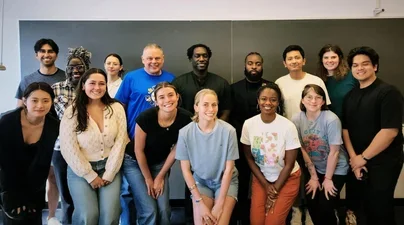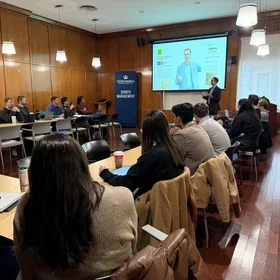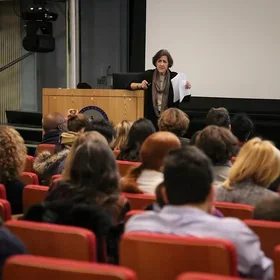By Jordyn Polet, Student in the M.S. in Negotiation and Conflict Resolution Program, School of Professional Studies
I am a soon-to-be graduate of the Master of Science in Negotiation and Conflict Resolution (NECR) program at Columbia University School of Professional Studies (SPS). In addition to my studies, I work with the New York Center for Interpersonal Development, where I lead peer mediation training for NYC public high school students and also serve Columbia’s Center for Justice as a research assistant.
This past summer, I had the pleasure of taking Dr. Peter Dixon’s fieldwork course Social Justice and Conflict Resolution: Public Safety in NYC, which explored the intersections of social justice and conflict resolution in New York City. The course centered on a simple yet profound question: “What does safety mean to residents, and how can NYC create a safe and just environment for everyone?”
Through theory-based readings, discussions, and workshops, Dr. Dixon’s course offered valuable insights into justice, policing, and safety, equipping us with practical skills to create actionable public safety policies and community-driven strategies.
Dixon’s course offered a unique opportunity to engage directly with practitioners, allowing us to see how abstract concepts of safety, trust, and justice are applied in real-world contexts. One such opportunity was a workshop focused on policing, where we heard from Derby St. Ford, an active NYPD officer and activist, and Edwin Raymond, a former NYPD officer and civil rights activist. Together, they shared their perspectives on the complexities of policing in NYC, discussing arrest quotas, reform efforts, and debates surrounding abolition and defunding. Their insights highlighted the importance of rethinking traditional policing approaches such as warrior culture and broken windows to better serve our communities.
Similarly, we had the chance to hear from Lynne Echenberg and Jeannie Melendez-Lopez from the Brooklyn District Attorney’s office, who shed light on the transformative potential of restorative justice as an alternative to punitive punishment. Melendez-Lopez shared her experience partnering with Project Restore Bed-Stuy, a community-based program developed by Columbia’s Center for Justice Innovation, to reduce gang violence in Bed-Stuy, Brooklyn, by addressing trauma, social isolation, and barriers to personal growth.

Photo Credit: Edwin Raymond
In addition to guest speakers, one of the most impactful experiences of the course was our participation in a workshop at Bed-Stuy NEST focused on the idea of “safety.” This workshop brought together community members, representatives from the violence-prevention organization Both Sides of the Violence, the Center for Justice, and Shneaqua “Coco” Purvis, a community leader who was also involved in Project Restore Bed-Stuy. Drawing on definitions of safety shared by participants of Project Restore Bed-Stuy, we engaged in collaborative discussions that explored holistic understandings of safety and aimed to identify potential community-driven solutions. This experience allowed me to witness community-level safety and social justice initiatives in practice and opened my eyes to the impactful work being done by Columbia’s Center for Justice.
Inspired by this exposure, I felt driven to join the Center for Justice’s effort to advance community-driven approaches to justice and safety. Today, I assist the Center for Justice with adapting Project Restore Bed-Stuy to the Brownsville community. My role involves creating a cultural analysis of organized crime in Brownsville, examining how factors such as social media and gang indictments shape gang culture.
The analytical and practical skills I developed in Dixon’s course have been invaluable to my work at the Center for Justice and the New York Center for Interpersonal Development. By bridging theory and practice, “social justice” transcends a mere lens for analyzing issues. Rather, it serves as a central vehicle for facilitating transformative change. I hope my experience underscores the profound impact of integrating theory and knowledge with action and inspires others to engage in work that not only aligns with their passion but drives meaningful change.
Views and opinions expressed here are those of the authors, and do not necessarily reflect the official position of Columbia School of Professional Studies or Columbia University.
About the Program
Columbia University’s Master of Science in Negotiation and Conflict Resolution prepares students to analyze the root causes and dynamics of conflict and to transform disputes through reasoned and resourceful interventions. The program focuses on developing self-awareness, tenacity, and interpersonal competency; building common ground; opening lines of communication; ensuring representation and recognition; and building sustainable possibilities for resolution.
The fall 2025 application deadline for the M.S. in Negotiation and Conflict Resolution program is May 1. Learn more here.


